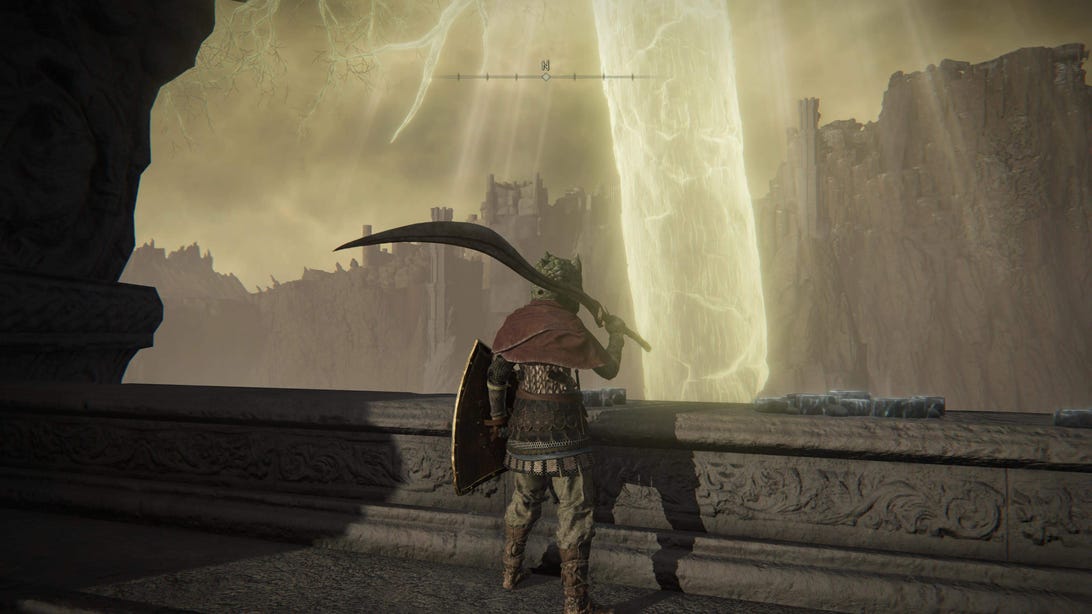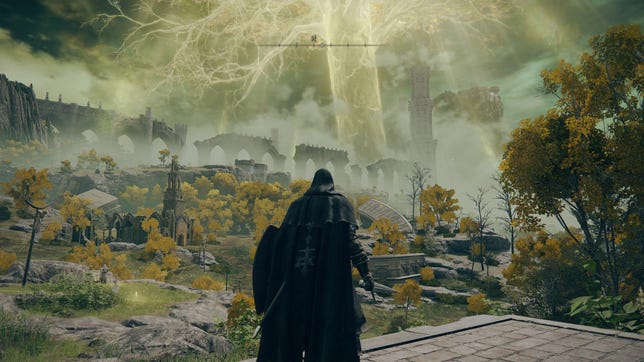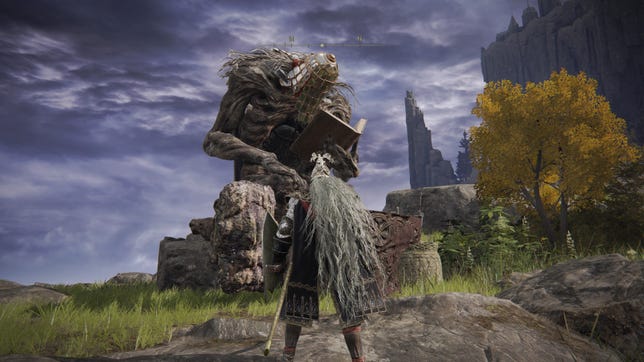
To say that Elden Ring’s open world is expansive, well, that’s a massive understatement.
From Software / Namco Bandai GamesFor the last couple of months, I’ve been trying to figure out why everyone currently drawing breath in this cursed earthly realm can’t stop playing, or talking about, Elden Ring.
It’s a mystery. It makes no sense.
Elden Ring, a brutally challenging open world RPG, hasn’t just been popular. The numbers have been astronomical.
Popularity was to be expected: From Software has released a number of hit titles. Dark Souls and Bloodborne have deservedly reached millions of players. But Elden Ring’s level of success has put the famed developer into a whole other stratosphere.
From Software’s last game, the highly rated, super popular Sekiro, took a year to shift 5 million copies. Bloodborne, a PlayStation 4 exclusive, sold around 3 million copies over its lifespan. From Software’s most successful release, Dark Souls 3 took around four years to sell 10 million copies.
Elden Ring sold 12 million copies in just over two weeks. Two weeks.
Those aren’t Dark Souls numbers, those are Grand Theft Auto numbers. Literally Elden Ring is matching pace with GTA V, a video game that’s sold 160 million copies to date. When you consider what Elden Ring is — a niche, system rich RPG so obstinate it literally hides its tutorial from players — the level of popularity is ludicrous. Elden Ring isn’t a watered-down product aimed at the broadest popular audience. It’s not Avengers Endgame. It’s like a David Lynch movie somehow pulling in a billion dollars at the box office.
And don’t you say you predicted it! I will kill you!

Vistas. So many vistas.
Screenshot by Andrew Gebhart/CNETDon’t you dare — with the benefit of hindsight — smugly declare that anyone could have seen this coming. Literally no-one could have predicted that Elden Ring could hit these giddy heights. It’s my job to anticipate trends like these and, with Elden Ring, I was a mile off. Without disclosing numbers, no game has come close to generating the interest and traffic Elden Ring has post launch — at least in my time at CNET. It’s unprecedented.
Is it the pandemic? We’ve gotten used to attributing COVID-19 for any and all emerging cultural trends. That said, video game sales have visibly spiked as a result of stay-at-home orders. And Elden Ring is a video game that sends its “tarnished” players forth into a long decaying world cursed by disease and rot.
But, no. Plenty of video games have been released — major titles — but none besides maybe Animal Crossing have come close to affecting the cultural conversation like Elden Ring. Its level of success is singular. And what makes it stand out is the surprise element. We didn’t see this coming.

It feels like a confluence of multiple factors. Elden Ring was blessed with the presence of Game of Thrones creator George R.R. Martin — he helped with the lore and universe building early in development. Surely, his name on the poster helped weave the game into the broader consciousness. The reviews, when they came, potentially had a higher impact. From the outset Elden Ring was a universally adored video game with a critical reception comparable to legendary games like Breath of the Wild or Skyrim. Almost instantly, Elden Ring was described as a video game experience you couldn’t afford to miss.
But if I had to ascribe Elden Ring’s success to one single metric, I’d say Word of Mouth. The numbers back me up here. A light survey done by GameIndustry.biz found that 40% of people bought the game after a friend recommended it.
I suspect Elden Ring inspires a different kind of recommendation in its fan base. Elden Ring isn’t just a very good video game that’s fun to play, it’s a game that binds itself to your identity like a parasite. You play Elden Ring because you are a “real gamer,” and you are a “real gamer” because you play Elden Ring. You don’t just consume Elden Ring as a passive distraction from the humdrum of everyday life — you consume Elden Ring because it says something about you as a human being: You like challenges, you don’t give up, you like acquiring new skills, you are [gasp] good at video games.
With Elden Ring that cultish devotion has gone viral on a level previously unheard of. The reviews were so strong, the game of such a high quality, that literally everyone in that core From Software cult (including myself) is screaming from the rooftops about it. This isn’t just another From Software game, it’s the culmination of decades of trust built up in a broadening fan base that has made liking these video games a core part of its personality.
Will those introduced to the Elden Ring cult stick around for the games that come after? My instincts say “yes.” Partly because, in its own unique way, Elden Ring is more accessible than previous From Software games. The open world structure makes its roadblocks less painful. If you’re stuck at a boss, you can simply go elsewhere and come back stronger, leveled up with better gear.

Elden Ring is about as visually inventive as video games get.
Bandai Namco/Screenshot by Daniel Van BoomElden Ring is also uniquely built to suit multiple different play styles. If your reflexes aren’t built for endless dodge-rolling, simply create a magic focused build and obliterate enemies from distance. For all the online talk of difficulty and “git gud” culture, Elden Ring actually caters to a broad spectrum of players.
Somehow Elden Ring has become the most popular video game in the world by compromising in ways that are near invisible to its core audience.
And that’s ultimately a very good thing! The trend in almost all forms of expensively produced entertainment — be it video games or movies — is risk management. In cinema, that usually means endless superhero movies and retreads of existing IP. In video games we have the “monogame.” Big budget titles have become almost indistinguishable from one another in terms of the systems that make them tick. Open world, crafting, leveling up, combat trees. Button presses do the same things and big budget gaming has smelted itself down into a boring, homogenized mess.
Elden Ring is popular, but it has become popular by refining its core promise, by doing something completely different to its competitive set. That’s very cool. In fact, it completely rules.
Long live the cult of Elden Ring.